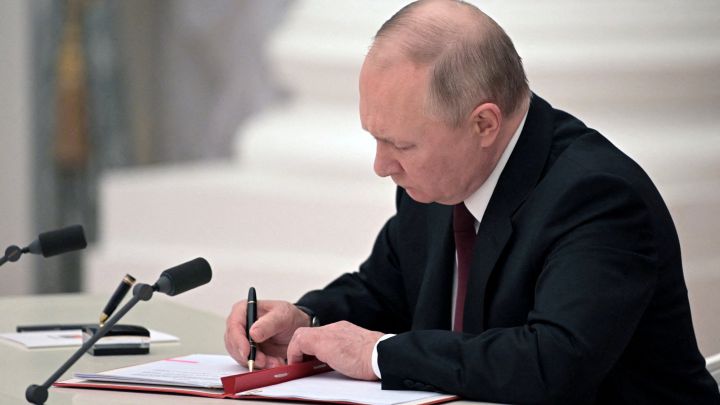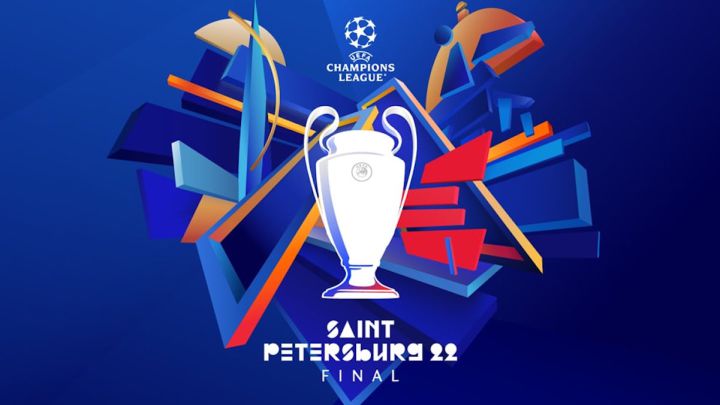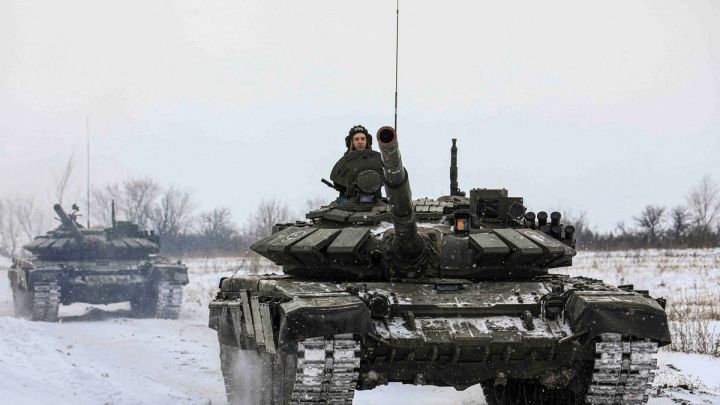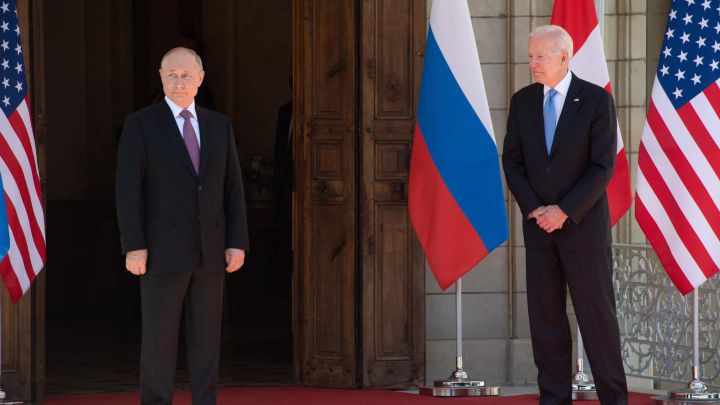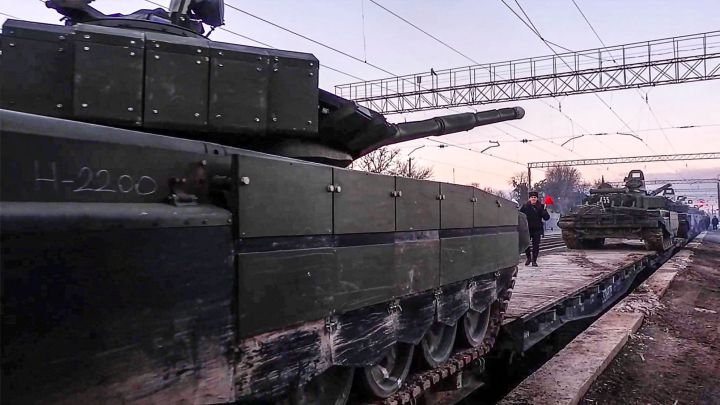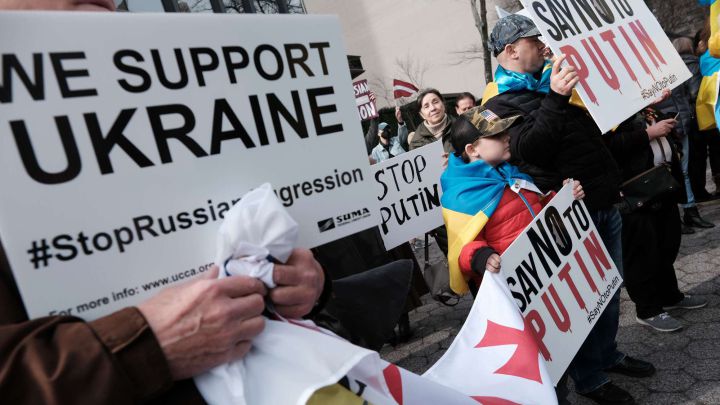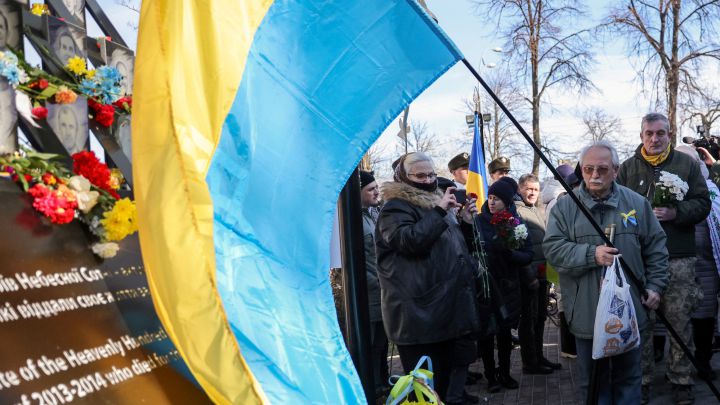Ukraine - Russia crisis news summary: 21 February 2022
Latest updates and information today on a potential Russian invasion of Ukraine as the US and others continue to warn that an attack is imminent.
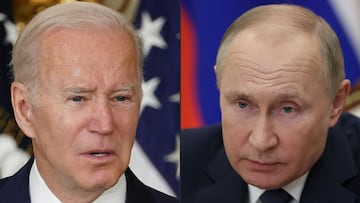
Show key events only
Ukraine-Russia crisis: live updates
"Invasion", "war", "not peacekeepers" - rhetoric rising
As Brian Stelter highlights the language being used across US news outlets is intensifying on the worst outcome following President Putin's decision to formally recognise the two Ukraine regions as independent.
On Monday we watched as Russian President Vladimir Putin signed papers formally recognizing two breakaway regions of Ukraine as independent. He then sent in what he called "peacekeeping" forces to support their position, although most of the rest of the world saw that as heavily armed Russian troops crossing the border into Ukraine, heightening the threat that has been hanging over the country for several weeks.
After these most recent actions by Moscow, we saw the price of oil rocket - some experts suggesting that it could reach as much as $100 a barrel - and the United States is coordinating with allies and will announce new sanctions against Russia on Tuesday, US officials have said.
Oil prices surge
Oil prices jumped on the back of Russia's escalation of tensions, with US crude climbing 3.22% to $94 a barrel and Brent moving up 1.5% to $96.82.
Six languages in one...
This tweet is doing the rounds as Philip Crowther sends reports, flawlessly as far as we can tell, in six languages from Kyiv. 1.2 million views and rising rapidly.
Ukraine responds to Russia at UN
Sergiy Kyslytsya, the representative of Ukraine, replies to the statement from the Russian representative (see below), saying that "we are on our own land" and that Ukraine is not "afraid of anything or anyone".
Kyslytsya demanded that Russia cancel their recognition of the independence of two regions of Ukraine and return to the negotiating table, as well as condemning the order to "deploy additional Russian occupation troops to the territories in Ukraine."
Russia statement to UN Security Council
The Russian representative to the UN Security Council, Vasily Nebenzya, who is also the president of the Council, spoke in his capacity as the Russian representative to blame Ukraine for sabotaging the Minsk agreements, for shelling in the separatist regions and refusing to speak to Moscow-backed separatists in the east of the country. Nebenzya had no time for what he said was "emotional" reactions from the west and said that Ukraine was on the brink of "military adventure" and that Russia would not allow a "new bloodbath in the Donbas".
Russia claim that the regions have asked for independence since 2014 but only now Russia has decided to recognise that independence.
That was a highly combative speech from Nebenzya, who in response the many statements calling on Russia to deescalate said: "I’ll leave the direct verbal assault on us unanswered."
United Nations Security Council emergency meeting
The UN security council is holding an emergency meeting, which you can watch here.
Rosemary DiCarlo, United Nations under-secretary-general, said she is "deeply concerned" over the escalation of the crisis and urged the main players to work for a diplomatic solution.
Curiously, the presidency of the security council this month is held by Russia, meaning the Russian representative is asking each country to speak, with every representative so far calling on Russia to de-escalate.
Ukraine president calls for peace
The president of Ukraine Volodymyr Zelenskiy spoke on television in the wake of Putin's announcement and said: "We are not afraid. We won't cede anything", as well as calling for peace and saying his country was committed to diplomacy. He also said Russia's actions were a violation of Ukraine's integrity and sovereignty.
Zelenskiy: "We are dedicated to the peaceful and diplomatic path. We are on our land. We are not afraid of anything and anyone, we don’t owe anything to anyone, we will not concede anything to anyone.
It’s not February 2014, but February 2022. It’s a different country. There’s a different army. There’s a single goal: peace."
UN Secretary General António Guterres condems Russian action
Leaders from around the globe have released comments on Russia's action to recognize two regions in the Dombass as independent... the highest ranking leader of the world's largest diplomatic organization, UN Secretary General António Guterres put his statement out saying that he is now "greatly concerned." Later in his remarks he reaffrimed the UN's support for Ukraine's terrirorial soviergnrty.
A very small detail in the midst of Russia’s invasion of a sovereign nation - the Champions League final 2022 is due to take place in St Petersburg, Russia on 28 May this year
Various media outlets have said UEFA are said to be monitoring the situation, as would be expected, while UK tabloid the Daily Star say Wembley in London, England, would be considered as a possible alternative to host the showpiece match - though Jeremy Cross, the Star’s Chief Sports Writer didn’t name a source for that statement.
UEFA so far have not published anything on their website relating to the situation.
We have anticipated a move like this from Russia and are ready to respond immediately. President Biden will soon issue an Executive Order that will prohibit new investment, trade, and financing by U.S. persons to, from, or in the so-called DNR and LNR regions of Ukraine. This E.O. will also provide authority to impose sanctions on any person determined to operate in those areas of Ukraine. The Departments of State and Treasury will have additional details shortly. We will also soon announce additional measures related to today’s blatant violation of Russia’s international commitments.
Vladimir Putin recognizes two regions where Russian seperatists have been fighting as independnet
In a an address to the Russian people, President Vladimir Putin said that he would recognize two regions in Ukraine as independent after years of Russian separatists fighting in the area. This represents a serious escalation and Putin said in his address that he expected sanctions from the West shortly after the announcement.
Putin: Ukraine a country with no tradition of independent statehood
Reuters - President Vladimir Putin signed decrees on Monday to recognise two breakaway regions of eastern Ukraine as independent statelets, defying Western warnings that such a step would be illegal and would kill off peace negotiations.
He signed the documents after delivering an astonishing verbal attack on Ukraine in an televised speech lasting nearly an hour, in which he said neo-Nazis were on the rise, oligarchic clans were rife and called Ukraine a US colony with a puppet regime.
Putin said Ukraine was a country with no tradition of independent statehood and an artificial creation of Soviet state founder Vladimir Lenin - a restatement of views he has expounded previously and which Kyiv has rejected as a false and self-serving view of history.
Since the 1991 collapse of the Soviet Union, he said, Kyiv had taken advantage of Russia and subjected it to economic "blackmail".
Now its aspiration to join NATO posed a direct threat to Russia's security, he said.
"In NATO documents, our country is officially and directly declared the main threat to North Atlantic security. And Ukraine will serve as a forward springboard for the strike."
Putin shrugged off Western threats of sanctions in the event of Russian aggression against Ukraine.
"They are trying to blackmail us again. They are threatening us again with sanctions, which, by the way, I think they will introduce anyway as Russia's sovereignty strengthens and the power of our armed forces grows. And a pretext for another sanctions attack will always be found or fabricated."
He said Russia "has every right to take retaliatory measures to ensure its own security. That is exactly what we will do."
Russia's rouble, already under pressure from a vast Russian military buildup near Ukraine, tumbled to new weeks-long lows as Putin spoke from behind a wooden desk flanked by Russian tricolour flags.
The recognition of the breakaway Ukrainian regions amounts to a declaration by Russia that it no longer considers them to be part of Ukraine.
It could pave the way for Moscow to openly send military forces into both regions, using the argument that it is intervening as an ally to protect them against Kyiv.
Putin said it was a long overdue response to "those who embarked on the path of violence, bloodshed, lawlessness and did not recognize and do not recognize any other solution to the Donbass issue, except for the military one."
He demanded an immediate cessation of hostilities by Ukraine. "Otherwise, all responsibility for the possible continuation of the bloodshed will be entirely on the conscience of the regime ruling on the territory of Ukraine," he said.
NATO condemns Putin's recognition of Donetsk and Luhansk
AFP - NATO chief Jens Stoltenberg on Monday condemned Russian President Vladimir Putin's recognition of rebel-held areas in east Ukraine, saying it violated international agreements Moscow had signed.
"I condemn Russia's decision to extend recognition to the self-proclaimed 'Donetsk People's Republic' and 'Luhansk People's Republic,'" Stoltenberg said in a statement.
Putin: US and NATO have unashamedly turned Ukraine into a theatre of war
Ukraine wants to join NATO in future - but Russia is vehemently against this and Vladimir Putin claimed the Western alliance has "completely ignored our concerns", adding if Ukraine was admitted it would be a "direct threat" to Russian security.
During his lengthy speech on Monday, he said the question of Ukraine's entry to the pact has been decided in advance.
He said he understands that further enlargement of NATO is only a matter of time and the risk of a sudden strike against Russia will sharply grow if it expands.
The Russian president claimed the US and NATO have "unashamedly turned Ukraine into a theatre of war".
And he believed Ukraine plans to create its own nuclear weapons, adding that if it acquires weapons of mass destruction "the global situation will change drastically, we cannot ignore this".
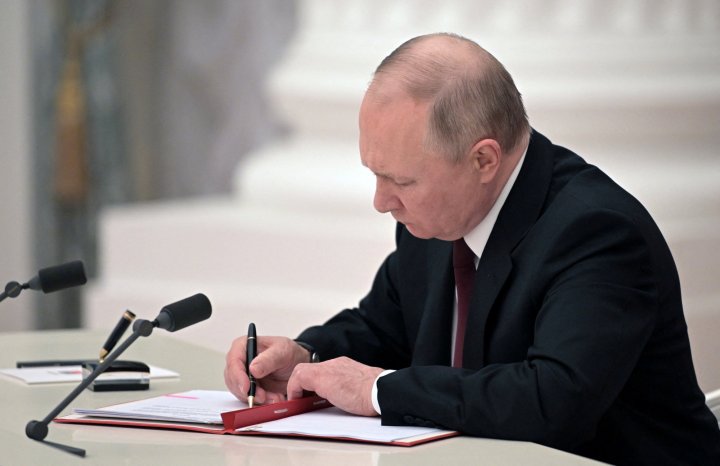
Russian President Vladimir Putin signs documents, including a decree recognising two Russian-backed breakaway regions in eastern Ukraine as independent entities, during a ceremony in Moscow, Russia.
(Photo: Sputnik/Alexey Nikolsky/Kremlin via Reuters)
Putin recognises two separatist regions in Ukraine as independent
Sky - Russian president Vladimir Putin has declared he recognises two separatist regions in Ukraine as independent.
Putin made the announcement during a live TV address which lasted around an hour. It comes after requests by the leaders of Russian-backed Luhansk and Donetsk - which broke away from Kyiv's control in 2014.
Recognition by the president of their independence could provide a pretext for Russian troops to cross the border into those areas.
And it could further narrow diplomatic options to avoid war, since it would be a rejection of a seven-year-old ceasefire brokered by France and Germany, under the Minsk agreement, which has been pushed as the framework for any future negotiations on the crisis.
What will Russian recognition of breakaway Ukraine regions mean?
Reuters - Russian President Vladimir Putin told the French and German leaders on Monday that he planned to sign a decree recognising two breakaway regions in eastern Ukraine as independent.
Here's a look at the implications for the wider crisis, in which the United States says Russia may be poised to invade Ukraine with a force of up to 190,000 troops it has massed near its neighbour's borders.
What are the breakaway regions?
Russian-backed separatists in the Donetsk and Luhansk regions - collectively known as the Donbass - broke away from Ukrainian government control in 2014 and proclaimed themselves independent "people's republics", until now unrecognised.
Since then, Ukraine says about 15,000 people have been killed in fighting. Russia denies being a party to the conflict but has backed the separatists in numerous ways, including through covert military support, financial aid, supplies of COVID-19 vaccines and the issue of at least 800,000 Russian passports to residents. Moscow has always denied planning to invade Ukraine.
What does Russian recognition mean?
For the first time, Russia is saying it does not regard the Donbass as part of Ukraine. That could pave the way for Moscow to send military forces into the separatist regions openly, using the argument that it is intervening as an ally to protect them against Ukraine. A Russian parliament member and former Donetsk political leader, Alexander Borodai, told Reuters last month that the separatists would then look to Russia to help them wrest control of parts of the Donetsk and Luhansk regions still under the control of Ukrainian forces. If that happened, it could lead to open military conflict between Russia and Ukraine.
What about the Minsk process?
Russian recognition effectively kills off the 2014-15 Minsk peace agreements that, although still unimplemented, have until now been seen by all sides, including Moscow, as the best chance for a solution. The accords call for a large degree of autonomy for the two regions inside Ukraine.
How will the west respond?
Western governments have been lining up for months to warn Moscow that any movement of military forces across the Ukrainian border would draw a strong response, including stringent financial sanctions.
US Secretary of State Antony Blinken said last week that recognition "would further undermine Ukraine’s sovereignty and territorial integrity, constitute a gross violation of international law, (and) call into further question Russia’s stated commitment to continue to engage in diplomacy to achieve a peaceful resolution of this crisis".
He said it would necessitate a "swift and firm" response from the United States and its allies.
Has Russia recognised breakaway statelets before?
Yes - it recognised the independence of Abkhazia and South Ossetia, two Georgian breakaway regions, after fighting a short war with Georgia in 2008. It has provided them with extensive budget support, extended Russian citizenship to their populations and stationed thousands of troops there.
What are the pros and cons for Moscow?
In the Georgia case, Russia used recognition of the breakaway regions to justify an open-ended military presence in a neighbouring former Soviet republic in an attempt to indefinitely thwart Georgia's NATO aspirations by denying it full control of its own territory. The same considerations would apply to Ukraine.
On the downside, Moscow faces sanctions and international condemnation for abandoning the Minsk process after long maintaining that it was committed to it. It will also be saddled indefinitely with responsibility for two territories ravaged by eight years of war and in need of massive economic support.
What Are the Minsk Agreements?
The major disagreements over Minsk II stem from differing interpretations of Russia’s role in the conflict and how the points should be implemented.
The Minsk accord does not contain any obligations that Russia is bound to fulfill. Moscow calls itself a mediator, like the OSCE, to help Ukraine and the Donetsk and Luhansk People’s Republics reach an agreement, according to BBC Russia.
Russia will recognize the separatist regions of Donetsk and Luhansk as independent states
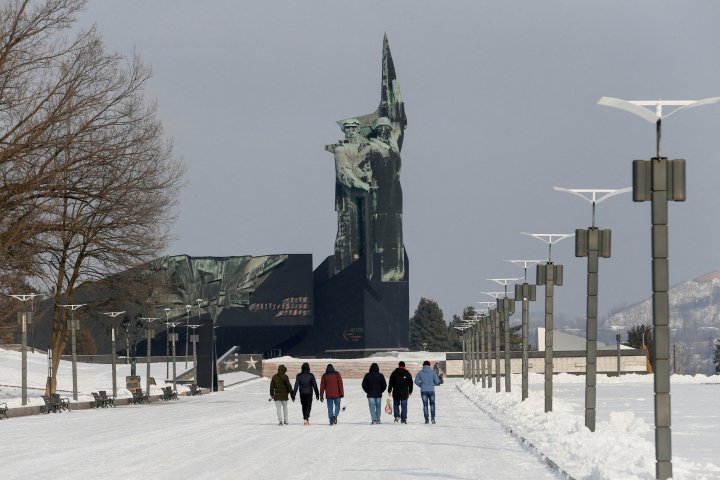
Russia recognising breakaway Ukraine regions would be 'deplorable' -U.S.
It would be "deplorable" if Russia recognised two regions of eastern Ukraine held by Russian-backed separatists as independent, the U.S. ambassador to the Organization for Security and Cooperation (OSCE) in Europe said on Monday.
"If carried out, this would again result in the upending of the rules based international order, under the threat of force.
This, dear colleagues, is deplorable, and ... condemnable. And should be (condemned), by all of us," Michael Carpenter said in a statement to a meeting of OSCE participating states.
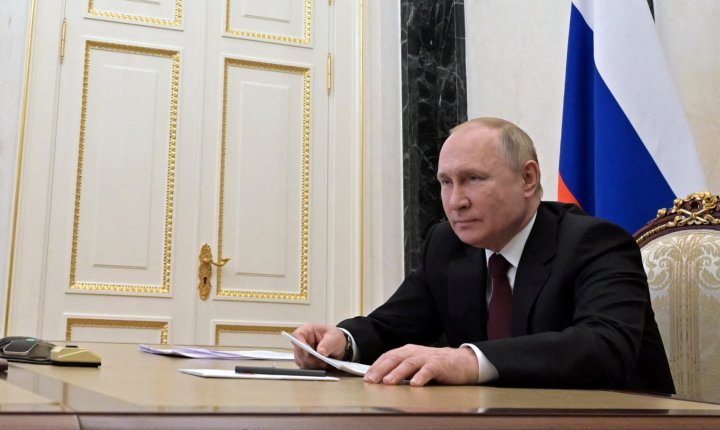
Putin to deliver video address to nation on Monday - state TV
Russian President Vladimir Putin will deliver a video address to the nation on television on Monday evening, the Rossiya-24 state television channel said.
It did not say exactly when it would happen, but that it would be soon.
Putin said earlier that Russia would decide whether or not to recognise the independence of two breakaway regions in eastern Ukraine later on Monday.
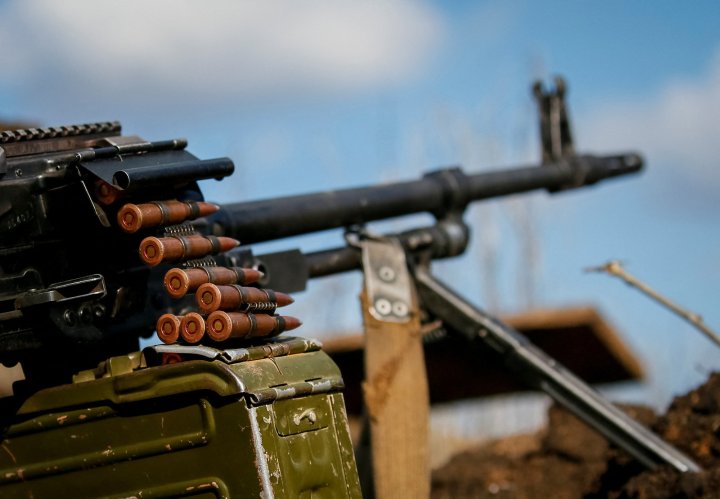
What are the Minsk agreements on the Ukraine conflict?
U.S. authorities have warned Russia not to invade Ukraine and urged both countries to return to a set of agreements designed to end a separatist war by Russian speakers in eastern Ukraine.
Here is a look at the agreements, which were signed in Minsk in 2014 and 2015.
MINSK I
Ukraine and the Russian-backed separatists agreed a 12-point ceasefire deal in the Belarusian capital in September 2014. Its provisions included prisoner exchanges, deliveries of humanitarian aid and the withdrawal of heavy weapons, five months into a conflict that had by then killed more than 2,600 people - a toll that Ukrainian President Volodymyr Zelenskiy says has since risen to around 15,000.
The agreement quickly broke down, with violations by both sides.
MINSK II
Representatives of Russia, Ukraine, the Organisation for Security and Cooperation in Europe (OSCE) and the leaders of two pro-Russian separatist regions signed a 13-point agreement in February 2015.
The leaders of France, Germany, Russia and Ukraine, gathered in Minsk at the same time, issued a declaration of support for the deal.
It set out military and political steps that remain unimplemented. A major blockage has been Russia's insistence that it is not a party to the conflict and therefore is not bound by its terms. Point 10, for example, calls for the withdrawal of all foreign armed formations and military equipment from the two disputed regions, Donetsk and Luhansk: Ukraine says this refers to forces from Russia, but Moscow denies it has any forces there.
The 13 points were, in brief:
1. An immediate and comprehensive ceasefire
2. Withdrawal of all heavy weapons by both sides
3. Monitoring and verification by the OSCE
4. To start a dialogue on interim self-government for the Donetsk and Luhansk regions, in accordance with Ukrainian law, and acknowledge their special status by parliamentary resolution.
5. A pardon and amnesty for people involved in the fighting
6. An exchange of hostages and prisoners.
7. Provision of humanitarian assistance.
8. Resumption of socio-economic ties, including pensions.
9. Restoration of full control of the state border by the government of Ukraine.
10. Withdrawal of all foreign armed formations, military equipment and mercenaries.
11. Constitutional reform in Ukraine including decentralisation, with specific mention of Donetsk and Luhansk.
12. Elections in Donetsk and Luhansk on terms to be agreed with their representatives.
13. Intensifying the work of a Trilateral Contact Group comprising representatives of Russia, Ukraine and the OSCE.
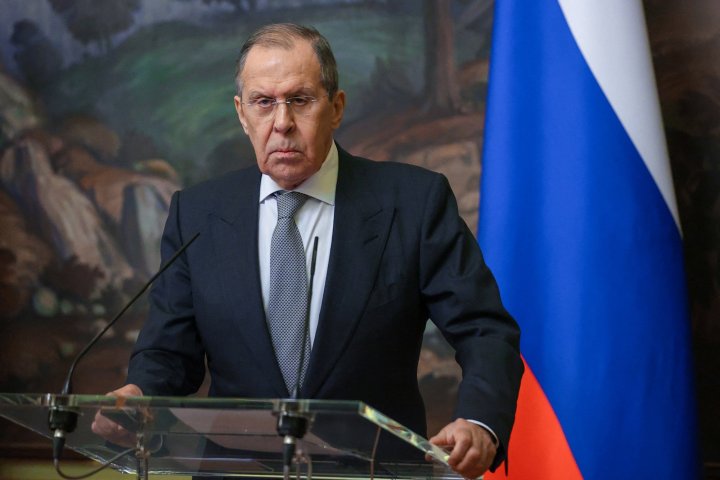
Russian foreign minister says Minsk agreements are only way to solve Ukrainian conflict
Russian Foreign Minister Sergei Lavrov told his German counterpart Annalena Baerbock on Monday that the Minsk agreements are the only way for long-term regulation of the Ukrainian internal crisis, Russia's foreign ministry said.
Lavrov, who spoke to Baerbock by phone, said Germany should put pressure on the Ukrainian leadership to prompt it to adopt a more constructive position amid the unfolding crisis in eastern Ukraine, the ministry added.
CNN on the complexeties of reporting from Ukraine
Putin “in danger of setting himself on a tragic course of events” - UK defence secretary
The UK’s defence secretary, Ben Wallace, has told the House of Commons that British intelligence reports suggest Russian President Vladimir Putin is “committed to an invasion” of Ukraine, adding that Putin is “in danger of setting himself on a tragic course of events”.
“In the last 48 hours, contrary to Kremlin assurances, we’ve seen a continued increase in troop numbers and a change in force disposition, moving from holding areas to potential launch locations - all the indicators point to increasing numbers and readiness of Russian forces,” Wallace said on Monday.
“Complementing this troop build-up has been a proliferation of false flag operations, propaganda stunts and Russian news outlets carrying fictitious allegations. These are not the acts of the Russian government fulfilling its repeated declarations that it has no intention of invading Ukraine.
“In fact, we’ve seen over the last few weeks the Russian playbook being implemented in a way that gives a strong cause for concern that President Putin is still committed to an invasion.
“I believe he is in danger of setting himself on a tragic course of events, leading to a humanitarian crisis, instability, and widespread suffering. Not just of Ukrainians, but also of the Russian people.”
AS USA's Maite Knorr-Evans looks at the geography of the Ukraine-Russia tensions.
"Another fake" - Ukraine denies Russian claims of border breach
Russian claims that its forces killed a group of five saboteurs who breached the country's southwest border from Ukraine on Monday have been dismissed as "another fake" by Kyiv.
According to a Russian Southern Military District statement quoted by news agencies, a Federal Security Service border patrol around 03:00 GMT identified a sabotage and reconnaissance group that had breached the border in Rostov region, prompting it to call troops for backup. A clash ensued, it said.
"Two Ukrainian army infantry fighting vehicles crossed the state border into the Russian Federation to evacuate the sabotage group from the territory of Ukraine," it said.
"As a result of the engagement, five members of the sabotage and reconnaissance group who violated the Russian border were eliminated," it said.
The group was detected near the village of Mityanskaya in Russia's Rostov region, it said, adding that there were no casualties on the Russian side.
Ukraine dismissed the account as false information. "Another fake. We don't have people there, nor could they be," Ukraine's military said.
(Reuters)
Russian plan for Ukraine invasion "has already begun"
A spokesperson for UK Prime Minister Boris Johnson has told reporters that a Russian invasion of Ukraine is in effect already underway.
"The intelligence we are seeing suggests that Russia intends to launch an invasion and that President Putin's plan has already begun," the spokesperson told reporters, per Reuters.
"We're seeing elements of the Russian playbook that we would expect to see in certain situations, starting to play out in real time."
US President Joe Biden has agreed "in principle" to a summit with Russia's Vladimir Putin, although officials on both sides have tempered hopes of a such meeting, while White House Press Secretary Jen Psaki says it will only take place "if an invasion hasn't happened".
"Everything should happen with our participation"
Ukraine welcomes the possibility of a summit between US President Joe Biden and Russian President Vladimir Putin, but nothing can be solved without Kyiv's involvement, Ukraine's top security official said on Monday.
"No one can resolve our issue without us," Oleksiy Danilov, the head of Ukraine's National Security and Defence Council, told a briefing. "Everything should happen with our participation."
(Reuters)
Do you feel as though some of the reporting on the Ukraine situation has been sensationalist or poorly researched? Oli Povey thought that this was the case and had a look at recent posts from journalists, with a reminder on due diligence.
Ukraine flight plans adjusted
Ukraine's infrastructure minister has said today that about 10 airlines had adjusted their scheduled flights to Ukraine amid tensions with Russia but said its air corridors were still open and flying to the East European country remained safe.
Germany's Lufthansa said it was halting flights to Ukraine from today, joining KLM which already suspended flights.
Scandinavian airline SAS also suspended weekly flights while Air France has decided to cancel its Tuesday flights between Paris and Kyiv as a "precautionary measure" on the back of rising tensions between Russia and Ukraine.
"The current cancellation of flights by a number of foreign airlines is dictated solely by the information aggravation of the situation, and not by real changes in flight safety," Oleksander Kubrakov told a news briefing.
He did not name the airlines and said that "the state is working to replace cancelled flights".
Kubrakov said Ukraine International Airlines (UIA) had already opened ticket sales and increased the capacity of aircraft on additional flights from Kyiv to Munich and Geneva which Lufthansa was unable to operate.
Two Ukrainian airlines last week disclosed problems in securing insurance for some of their flights while foreign carriers began avoiding the country's airspace as Russia masses a huge military force on its border.
UIA said it had received the notification from its insurers as experts said more airlines were expected to avoid Ukraine's airspace after a U.S. warning that Moscow could invade its neighbour any time.
Russia and Ukraine both hinted at fresh diplomatic efforts to avoid conflict on Monday, but Ukraine's biggest airline said its insurers had already terminated cover for at least some of its aircraft on flights inside Ukrainian airspace.
However, international airlines are not pulling out due to lack of insurance, said Bruce Carman, chief underwriting officer at Hive Aero in London.
"We continue to support many airlines that fly into the region."
EU tells Ukraine now is not yet time for Russian sanctions
The European Union will not impose sanctions on Russia just yet, its foreign policy chief said today, via Reuters, rebuffing a call from Kyiv to take such steps now to avert a war rather than wait until after any possible Russian invasion.
Western countries fear a build-up of Russian troops near Ukraine in recent weeks is a prelude to an invasion, which Moscow denies. The United States and European allies have said any attack would trigger severe sanctions against Moscow, but Kyiv wants these to be imposed now.
"We expect decisions," Ukraine's Foreign Minister Dmytro Kuleba said in Brussels before addressing a regularly scheduled meeting of EU foreign ministers.
"We believe that there are good and legitimate reasons to impose at least some of the sanctions now to demonstrate that the European Union is not only talking the talk about sanctions, but is also walking the walk."
Germany calls out Russian games
Germany has called on Russia to stop “playing with people’s lives” saying that they should return to the negotiation table for a peaceful solution to the Ukraine crisis.
Speaking to reporters in Brussels, German Foreign Minister Annalena Baerbock expressed deep concern over escalating tensions in eastern Ukraine, with growing number of cease-fire violations in recent days.
“The Russian government is really playing with people’s lives in the occupied territories, this is irresponsible,” she said, referring to the reports of increased shelling from the Donetsk and Luhansk regions, controlled by pro-Russian separatists.
“I am making an urgent appeal to the Russian president, please don’t play with human lives. What we have witnessed in the region over the last 72 hours, with attacks, violent clashes, is really concerning,” she said.
More on Russia claims of Ukraine shell attack
As we reported earlier, Russia's FSB security service said a shell fired from Ukrainian territory had completely destroyed a border guard post in Russia's Rostov region but caused no casualties.
Ukraine denied responsibility for the incident, which took place at a moment of extreme tension between the two countries as Russia continues to deny statements from the United States and its allies that it could invade Ukraine at any time.
"At 9:50 a.m. (0650 GMT) an unidentified projectile fired from Ukrainian territory completely destroyed a service point of the FSB border guards in the Rostov region, located about 150 metres away from the Russia-Ukraine border," the FSB said in a statement. "There are no casualties. Sappers are working there."
The RIA news agency shared video footage published by the FSB, which showed that a small outhouse had been torn apart. The footage did not show the projectile.
Ukraine said it had not shelled Russian territory. Its military has previously accused Russia of faking pictures of shells to make out they were Ukrainian, and said that mercenaries have arrived in separatist-held eastern Ukraine to stage provocations in collaboration with Russian special forces.
Shelling across the line dividing Ukrainian government forces and pro-Russian separatists in eastern Ukraine has intensified since last Thursday and diplomatic efforts to avert a military conflict between Russia and Ukraine have increased.
Russian-backed rebels seized a swathe of eastern Ukraine in 2014, the same year Russia annexed Crimea from Ukraine. Kyiv says that since then, some 15,000 people have been killed in the conflict in the east.
Russia already feeling financial imapact
The potential sanctions that lie ahead are said to be extremely tough, but even before those are introduced by multiple and united nations, Russia is already feeling a financial impact to their aggressive moves.
UK's Truss says Russian invasion "highly likely"
British foreign minister Liz Truss has said today that she was stepping up preparations with allies for the worst case scenario in the Ukraine crisis, adding that a Russian invasion was highly likely.
"Diplomacy must be pursued but a Russian invasion of Ukraine looks highly likely. The UK and allies are stepping up preparations for the worst case scenario," she said on Twitter following talks with NATO Secretary General Jens Stoltenberg in Brussels.
"We must make the cost for Russia intolerably high."
More flights to Ukraine cancelled
According to reports, Lufthansa and Swiss Air have become the latest carriers to suspend flights to Ukraine amid growing fears of a possible Russian invasion.
Ukraine denies Russian claims of shelling
News agency AFP has followed up on the previous breaking news about claims that the Ukraine had shelled a Russian border facility this morning, saying that they have been denied.
As reports from Russia about a shell attack have started to come in today, more questions are being asked about what a false flag operation is. Well, in relation to war and violent conflicts, it refers to situation wherein one group commits an act which aims to avoid being blamed or shift blame to another party to justify an attack of invasion.
For weeks, the United States has been stating publicly that Russia might be planning a false flag operation to create a pretext to invade Ukraine. During Secretary of State Anthony Bliken's speech in front of the United Nations Security Council on 17 February he said that "Russia plans to manufacture a pretext for its attack."
He warned leaders that this pretext could come in various forms including the possibility of a "fabricated so-called “terrorist” bombing inside Russia, the invented discovery of a mass grave, a staged drone strike against civilians, or a fake – even a real – attack using chemical weapons."
Maite Knorr-Evans brings you more.
Germany to contact Moscow today
According to a spokesman, the German chancellor is expected to hold a phone call with the Russian president today in order to push once again for a diplomatic solution to the Ukraine crisis.
Ukraine President pondering war
'It’s not hard to guess what President Volodymyr Zelensky of Ukraine must be craving right now: one normal day.' That's how Olga Rudenko, a Ukrainian journalist and the chief editor of The Kyiv Independent, begins her opinion piece this morning for the NYT.
'The comic-turned-president surely never imagined the job would be quite so intense. First, he got tangled up in the impeachment of Donald Trump. Then he had to deal with the Covid pandemic. And now he’s facing the prospect of a full-scale invasion by Russia.
'Russia, of course, has been waging a war in eastern Ukraine since 2014. But now the threat is total: Up to 190,000 Russian troops have amassed near Ukraine’s borders and in separatist regions, and an invasion, bringing devastation and disaster, could come at any time. It’s a gravely serious situation. And Mr. Zelensky, a comedianfor most of his life, is in over his head.'
UK PM Johnson questions Putin's thinking
British Prime Minister Boris Johnson said he believes Russian leader Vladimir Putin might be thinking “illogically” about his initial plans to invade Ukraine, Reuters reported.
In an interview with the BBC on Sunday, Johnson said that threats of imposing sanctions onto Russia for the invasion “may not be enough to deter an irrational actor and we have to accept at the moment that Vladimir Putin is possibly thinking illogically about this and doesn't see the disaster ahead.”
Also Sunday, Johnson also said that the U.K and U.S. could cut Russian companies out of access to their currencies should an invasion by the Russian military occur.
"We are even, with our American friends, going to stop them trading in pounds and dollars," Johnson told the media outlet. "That will hit very, very hard."
Breaking | Moscow claims Ukraine shell fired
According to news agency AFP, Moscow has said that a shell fired from Ukraine has destroyed a Russian border facility.
More to follow as we get it...
Dubbed what could be the 'biggest war in Europe since 1945' by British Prime Minister Boris Johnson, Russian troop movements on the border with Ukraine have been causing a serious stir for the first two months of 2022. The US has claimed war has been imminent for the last two weeks, and many other countries have advised citizens to leave Ukraine for fear of invasion.
Ukraine has tried its best to be a calming influence on proceedings, but NATO and Russia continue to knock heads. Fighting recently resumed in the two eastern provinces of Donetsk and Luhansk, prompting cause for a ceasefire, while markets have tumbled in the last week as hopes for a diplomatic solution have fizzled away.
Both Ukraine and Russia are supported by their traditional allies, at least traditional in what can be considered the Realpolitik of the 21st century. A clash would be terrible for the world, and the myriad actors should hope that it does not come to war.
Kremlin: Talk of summit plans "premature"
After French President Emmanuel Macron said in a statement on Sunday evening that Biden and Putin had "accepted the principle" of a summit on the Ukraine-Russia crisis, a Kremlin spokesperson on Monday said it was too early to talk of "specific plans" for a meeting.
“It’s premature to talk about specific plans for a summit," Dmitry Peskov told reporters on Monday, per AP. “The meeting is possible if the leaders consider it feasible."
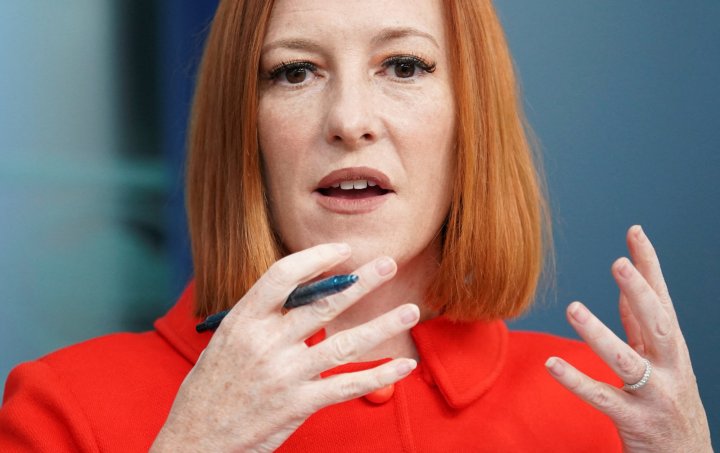
Biden agrees "in principle" to Putin talks - "if invasion hasn't happen"
In a statement on Sunday, White House Press Secretary Jen Psaki confirmed that US President Joe Biden has agreed "in principle" to a summit with Russian counterpart Vladimir Putin, "if an invasion hasn’t happened".
Psaki warned, however, that Russia continues to ready itself for an attack on Ukraine "very soon", adding that the country faces "swift and severe consequences" if it invades.
"As the President has repeatedly made clear," Psaki said in a statement, "we are committed to pursuing diplomacy until the moment an invasion begins. Secretary Blinken and Foreign Minister Lavrov are scheduled to meet later this week in Europe, provided Russia does not proceed with military action. President Biden accepted in principle a meeting with President Putin following that engagement, again, if an invasion hasn’t happened.
"We are always ready for diplomacy. We are also ready to impose swift and severe consequences should Russia instead choose war. And currently, Russia appears to be continuing preparations for a full-scale assault on Ukraine very soon."
(Photo: REUTERS/Kevin Lamarque)
Ukraine-Russia crisis live updates: welcome
Good morning and welcome to our live blog on the ongoing tensions between Ukraine and Russia, as the United States continues to warn that a Russian invasion of its neighbouring country is imminent.
French President Emmanuel Macron has sought to broker a summit between US President Joe Biden and Russian President Vladimir Putin. Biden has agreed in principle to the meeting, the White House says.
While Macron's office said Putin had also tentatively agreed to the talks, the Kremlin on Monday morning said it was "premature to talk about specific plans for a summit".
- Vladímir Putin
- Joseph Biden
- Washington D.C.
- Jens Stoltenberg
- Antony Blinken
- Volodimir Zelenski
- Diplomacy
- Kamala Harris
- Boris Johnson
- Olaf Scholz
- Emmanuel Macron
- Invasions
- Army
- Ukraine
- Armed forces
- United States
- Military action
- Borders
- Russia
- North America
- International relations
- Foreign policy
- Eastern Europe
- Defence
- Europe
- America
- Foreign relations
- Conflicts
